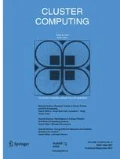Abstract
Reducing energy consumption in processors has become a critical issue in cluster systems. The dynamic voltage and frequency scaling (DVFS) is one of the effective techniques to minimize energy consumption in processors when executing parallel applications. These applications may consist of many interrelated tasks that may be computed when their precedence constraints are satisfied. The scheduling of these precedence-constrained tasks on to processors, to optimize makespan or energy consumption or both, has been studied as an NP-complete problem. Thus, many algorithms have been given by the researchers and newer algorithms keep coming in. In the parallel applications, there exist some tasks which may have slacks due to the dependencies between tasks. The EASLA (energy aware service level agreement) is one of the well-known energy-aware task scheduling algorithms which utilize the underused slack of tasks. In this paper, we present an improved version of its sub-algorithm, NCM (Not Changing Makespan), for heterogeneous cluster systems that is used to downscale frequencies when schedule length does not change. The presented algorithm also makes use of a fast and low complexity algorithm called PEFT (Predict Earliest Finish Time) to compute the schedule length of the application. We performed experiments for randomly generated graphs, and the results illustrate that the improved version of the NCM algorithm achieves better energy saving compared to the NCM algorithm.












Similar content being viewed by others
References
Power and cooling in data center. https://www.amd.com/Documents/34146A_PC_WP_en.pdf (2019). Accessed: 23 May 2019
Arabnejad, H., Barbosa, J.G.: List scheduling algorithm for heterogeneous systems by an optimistic cost table. IEEE Trans. Parallel Distrib. Syst. 25(3), 682–694 (2014)
Benini, L., Bogliolo, A., De Micheli, G.: A survey of design techniques for system-level dynamic power management. IEEE Trans. Very Large Scale Integr. Syst. 8(3), 299–316 (2000)
De Langen, P., Juurlink, B.: Leakage-aware multiprocessor scheduling for low power. In: Parallel and Distributed Processing Symposium, 2006. IPDPS 2006. 20th International, pp. 8–pp. IEEE (2006)
Forrest, W.: How to cut data centre carbon emissions. https://www.computerweekly.com/feature/How-to-cut-data-centre-carbon-emissions(2019). . Accessed: 23 May 2019
Ge, R., Feng, X., Cameron, K.W.: Performance-constrained distributed dvs scheduling for scientific applications on power-aware clusters. In: Proceedings of the 2005 ACM/IEEE Conference on Supercomputing, pp. 34–34. IEEE (2005)
Hu, Y., Liu, C., Li, K., Chen, X., Li, K.: Slack allocation algorithm for energy minimization in cluster systems. Future Gener. Comput. Syst. 74, 119–131 (2017)
Kaur, N., Bansal, S., Bansal, R.K.: Duplication-controlled static energy-efficient scheduling on multiprocessor computing system. Concurr. Comput. 29(12), (2017)
Kliazovich, D., Bouvry, P., Khan, S.U.: Dens: data center energy-efficient network-aware scheduling. Clust. Comput. 16(1), 65–75 (2013)
Kumar, N., Vidyarthi, D.P.: An energy aware cost effective scheduling framework for heterogeneous cluster system. Future Gener. Comput. Syst. 71, 73–88 (2017)
Lee, Y.C., Zomaya, A.Y.: Energy conscious scheduling for distributed computing systems under different operating conditions. IEEE Trans. Parallel Distrib. Syst. 22(8), 1374–1381 (2011)
Liu, W., Du, W., Chen, J., Wang, W., Zeng, G.: Adaptive energy-efficient scheduling algorithm for parallel tasks on homogeneous clusters. J. Netw. Comput. Appl. 41, 101–113 (2014)
Maurya, A.K., Tripathi, A.K.: Performance comparison of heft, lookahead, ceft and peft scheduling algorithms for heterogeneous computing systems. Proceedings of the 7th International Conference on Computer and Communication Technology (ICCCT’2017), pp. 128–132. ACM (2017)
Maurya, A.K., Tripathi, A.K.: Ecp: A novel clustering-based technique to schedule precedence constrained tasks on multiprocessor computing systems. Computing 100(8), 1015–1039 (2018)
Maurya, A.K., Tripathi, A.K.: An edge priority-based clustering algorithm for multiprocessor environments. Concurr. Comput. 31(11), e5060 (2018)
Maurya, A.K., Tripathi, A.K.: An energy aware edge priority-based scheduling algorithm for multiprocessor environments. Proceedings of the 24th International Conference on Parallel and Distributed Processing Techniques and Applications (PDPTA’18), pp. 42–46 (2018)
Maurya, A.K., Tripathi, A.K.: On benchmarking task scheduling algorithms for heterogeneous computing systems. J. Supercomput. 74(7), 3039–3070 (2018). https://doi.org/10.1007/s11227-018-2355-0
Mei, J., Li, K., Li, K.: Energy-aware task scheduling in heterogeneous computing environments. Clust. Comput. 17(2), 537–550 (2014)
Rivoire, S., Shah, M.A., Ranganathan, P., Kozyrakis, C.: Joulesort: a balanced energy-efficiency benchmark. In: Proceedings of the 2007 ACM SIGMOD international conference on Management of data, pp. 365–376. ACM (2007)
Sharifi, M., Shahrivari, S., Salimi, H.: Pasta: a power-aware solution to scheduling of precedence-constrained tasks on heterogeneous computing resources. Computing 95(1), 67–88 (2013)
Simunic, T., Benini, L., Acquaviva, A., Glynn, P., De Micheli, G.: Dynamic voltage scaling and power management for portable systems. In: Proceedings of the 38th annual Design Automation Conference, pp. 524–529. ACM (2001)
Srivastava, M.B., Chandrakasan, A.P., Brodersen, R.W.: Predictive system shutdown and other architectural techniques for energy efficient programmable computation. IEEE Trans. Very Large Scale Integr. Syst. 4(1), 42–55 (1996)
Swaminathan, V., Chakrabarty, K.: Pruning-based, energy-optimal, deterministic i/o device scheduling for hard real-time systems. ACM Trans. Embed. Comput. Syst. 4(1), 141–167 (2005)
Terzopoulos, G., Karatza, H.D.: Power-aware bag-of-tasks scheduling on heterogeneous platforms. Clust. Comput. 19(2), 615–631 (2016)
Topcuoglu, H., Hariri, S., Wu, M.y.: Performance-effective and low-complexity task scheduling for heterogeneous computing. IEEE Trans. Parallel Distrib. Syst. 13(3), 260–274 (2002)
Wang, L., Khan, S.U., Chen, D., KołOdziej, J., Ranjan, R., Xu, C.Z., Zomaya, A.: Energy-aware parallel task scheduling in a cluster. Future Gener. Comput. Syst. 29(7), 1661–1670 (2013)
Wang, L., Von Laszewski, G., Dayal, J., Wang, F.: Towards energy aware scheduling for precedence constrained parallel tasks in a cluster with dvfs. In: Proceedings of the 2010 10th IEEE/ACM International Conference on Cluster, Cloud and Grid Computing, pp. 368–377. IEEE Computer Society (2010)
Wang, S., Qian, Z., Yuan, J., You, I.: A dvfs based energy-efficient tasks scheduling in a data center. IEEE Access 5, 13090–13102 (2017)
Xie, G., Jiang, J., Liu, Y., Li, R., Li, K.: Minimizing energy consumption of real-time parallel applications using downward and upward approaches on heterogeneous systems. IEEE Trans. Ind. Inf. 13(3), 1068–1078 (2017)
Zahaf, H.E., Benyamina, A.E.H., Olejnik, R., Lipari, G.: Energy-efficient scheduling for moldable real-time tasks on heterogeneous computing platforms. J. Syst. Archit. 74, 46–60 (2017)
Zhu, X., He, C., Li, K., Qin, X.: Adaptive energy-efficient scheduling for real-time tasks on dvs-enabled heterogeneous clusters. J. Parallel Distrib. comput. 72(6), 751–763 (2012)
Zong, Z., Manzanares, A., Ruan, X., Qin, X.: Ead and pebd: two energy-aware duplication scheduling algorithms for parallel tasks on homogeneous clusters. IEEE Trans. Comput. 60(3), 360–374 (2011)
Acknowledgements
We would like to thank the anonymous referees for their useful suggestions.
Author information
Authors and Affiliations
Corresponding author
Additional information
Publisher's Note
Springer Nature remains neutral with regard to jurisdictional claims in published maps and institutional affiliations.
Rights and permissions
About this article
Cite this article
Maurya, A.K., Modi, K., Kumar, V. et al. Energy-aware scheduling using slack reclamation for cluster systems. Cluster Comput 23, 911–923 (2020). https://doi.org/10.1007/s10586-019-02965-7
Received:
Revised:
Accepted:
Published:
Issue Date:
DOI: https://doi.org/10.1007/s10586-019-02965-7




